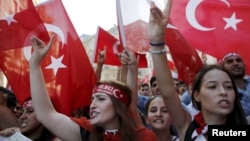Eighteen mayors and nearly 50 locally elected representatives of the pro-Kurdish Peoples' Democratic Party are being prosecuted in Turkey.
Earlier this month, for example, the mayor of Van was sentenced to 15 years in jail on charges of being a member of the outlawed Kurdistan Workers' Party.
The prosecutions and severity of the charges are unprecedented, says senior Turkey researcher Emma Sinclair Webb of the U.S.-based Human Rights Watch.
"It is the most serious move against democratically elected mayors in towns we have seen in years,” she said. “Mayors have been targeted in the past, with arrest and periods in jail. But the charges they face this time are unprecedented. Basically they amount to life in prison for offenses that do not in any way amount to terrorism or violence and deadly acts."
Most of the charges against the representatives are for attempting to overthrow the state, following statements calling for Kurdish autonomy.
For more than a month, Turkish security forces have been attempting to eradicate the presence of PKK rebels in towns and cities across the predominantly Kurdish southeast.
Prime Minister Ahmet Davutoglu defended the prosecutions, accusing the mayors of working with the rebels.
Davutoglu said their concern is polemics, ideology and terror.
The mayors, he said, spend the people's money in dark channels and function as the logistics center of terrorists. Now, he said, the mayors had to account "for this betrayal."
But political scientist Cengiz Aktar of Istanbul's Suleyman Sah University says these are the same policies used by the state since the PKK took up arms in 1984.
"The Turkish establishment, be it civilian or military, is repeating the same good old strategy of repression, hoping that this time it will produce another result,” Aktar said. “Of course, it will not. The Kurdish problem cannot be resolved by force. I mean, the Turkish political establishment is back to square one."
Observers say the government appears to believe it has no one to negotiate with and that current representatives of the Kurds are part of the problem, rather than the solution.













